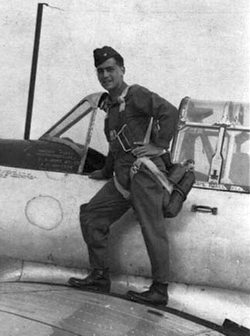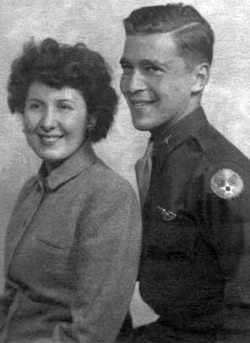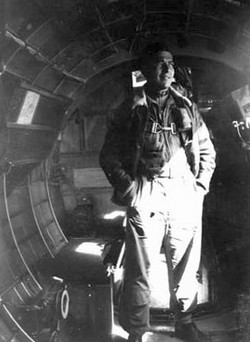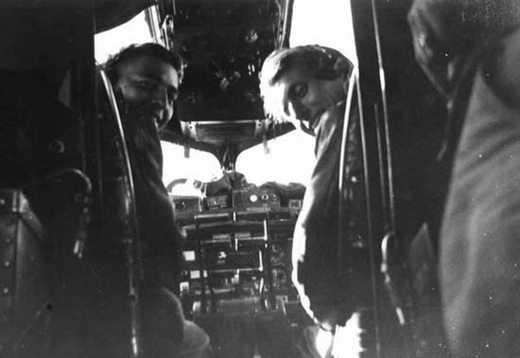Overseas Shipment and Combat Group Assignment
Transition Training — B-17 Flying Fortress
After two weeks of rest and recuperation in the bosoms of our families and visiting the highlights of what New York had to offer a newly commissioned second lieutenant with pilots wings, we regretfully headed south to my new assignment. 4 engine transition school (B-17).
The transition school was located near Sebring, Florida which was lake resort prior to the war. The town was on the shore of a delightful fresh water lake over which the sunsets were eye catching. There was the usual hassle of finding a place to stay. After a few days we located a room in a house on the lake or I should say a hallway that had been blocked off with a door on each end. Happy to get it since the attic was already occupied. The women owner slept on the porch. We never could decide whether she was patriotic or cashing in. Considering the price we paid, guess it was the later.
It didn’t take long before I was immersed in the training routine; shepherding 4 engines instead of two; emergency procedures when losing an engine on takeoff, on two in the air, one on each side; or two on one side; landing with 1,2 or 3 out. More instrument, formation and night flying. The B-17 wasn’t designed for 5 foot 6 inch pilots but two extra back pillows solved that problem. Lots of muscle was required to fly this aircraft but you developed these as you go along.
On a cross country night training flight, with myself another pilot and a flight engineer; after climbing above the overcast the flight engineer started pounding my shoulder and pointed to the left wing; number one engine was on fire. With beating hearts we went thru the engine feathering procedure and hit the fire extinguishers. To our chagrin the blaze continued lighting up the entire wing. We had to get on the ground quickly. Our gas supply was located in the wings behind the engines. To our embarrassment none of us now knew where we were. I let down slowly thru the overcast and was delighted to spot a airport beacon. Although we didn’t know its location we made a fast pass over the tower, entered the traffic pattern and landed, although the runway was shorter than I would have liked. A fire truck made short work of the blaze and after discreetly asking for a phone to call our field and incidentally spotting our location (hot pilots are not supposed to get lost) we let our squadron know where we were. The only question asked was the condition of the aircraft. I guess it was more important than two fledging pilots. This incident helped our confidence, particularly after getting back, the squadron commander stating, «Good work, Levine». Of course he was never told that we had been lost.
After completing 125 training hours in the B-17, Doris and I went on to Plant Park, Tampa, Florida where replacement crews were assembled. My crew consisted of myself, a copilot, navigator, bombardier, top turret gunner, radio operator, ball turret gunner two waist gunners and a tail gunner.
Doris and I remember the two weeks in Tampa as the hottest, most humid assignment thus far and spent most of it hopping from one air conditioned location to another. As luck would have it my crew was assigned to Drew Field just outside of Tampa for operational training. During our stay in Tampa we had had some lengthy discussions about the importance of this training phase and reluctantly decided that Doris would return to New York so that I could focus on training my crew for our combat assignment. In addition we had developed a money shortage due to overspending for air conditioned hotel rooms and a month in New York earning a New York salary would be helpful. This all sounded very logical at the time but shortly after we parted I felt so lonely I started a flow of letters to Doris expressing my feelings asking her to return sooner.
Evidently Doris was also lonely so before long we were reunited and managed financially somehow.
Operational Training and Crew Bonding
 The flight routine at Drew Field was as hectic and consuming as before. Emphasis was placed on developing crew discipline and coordination. Each of the crew members was familiarized with the requirements of the other positions so that in case of an emergency he could take over. The bombardier and navigator were given time at the controls so there was a possibility of bringing the aircraft home in case both pilots were incapacitated. We were an informal crew with a minimum of `sirs’; first or last names were utilized.
The flight routine at Drew Field was as hectic and consuming as before. Emphasis was placed on developing crew discipline and coordination. Each of the crew members was familiarized with the requirements of the other positions so that in case of an emergency he could take over. The bombardier and navigator were given time at the controls so there was a possibility of bringing the aircraft home in case both pilots were incapacitated. We were an informal crew with a minimum of `sirs’; first or last names were utilized.
There were simulated missions flown in formation at high altitudes. Unfortunately not as high as the combat missions were flown. The flight characteristics of the aircraft are affected by the air density and consequently the 25 to 30,000 foot altitudes made the aircraft respond very sluggishly. Even the 12,000 foot altitudes of our training missions made for tricky handling in formation. Two aircraft were lost in a cross over maneuver on one mission due to the inexperience of the pilots and the other just being there.
Shortly before finishing our training I was once again called home to New York by the Red Cross, my mother critically ill. Doris and I left hastily to find the crisis was past, so after a few days of visiting we returned to Florida to find my crew had been shipped out with an instructor pilot in my place.
I was assigned a new crew, whose pilot had broken a leg playing volley ball. They were in the mid phase of their training.
It only took a short while to blend into the new crew. They had been well trained and since I was repeating a month of training, with an additional hundred hours of flying experience I felt very prepared for what was ahead. This crew was quieter less boisterous, perhaps less standout in a crowd but always ready to overcome problems when they materialized. Our completed 35 mission tour over Germany proved this point.
Overseas Shipment and Combat Group Assignment
November 30, 1944 (from the diary)
We left the camp last night.
From the train we were ferried across the Hudson River to a pier on 40th street, Manhattan. We were greeted by the Red Cross and handed coffee, doughnuts and chocolate bars. The ocean liner was the Ile de France.
December 3, 1944 (from the diary)
Services were held all over the boat this morning. Lots of the boys are suddenly getting religious.
December 9, 1944 (from the diary)
Finally left the transport this afternoon. Trains were waiting and little time was lost boarding them. We pulled out almost immediately. The train was a speedy little thing, divided into compartments, just as we’ve seen in the movies. Did not see much of the countryside as night fell rapidly. What was most impressive was the neat, well built houses; they all seem to carry on air of thriftiness about them.
The brakeman became quite friendly after we gave him the sugar and cigarettes from our K-rations. He spoke of the strict rationing of meat, eggs and milk. Also mentioned the horrible bombings of 1940 and 41; some lasting as long as 12 hours. The buzz bombs fell in the vicinity of London only.
December 10, 1944 (from the diary)
Well, we are now in a replacement center somewhere in England.
19 December 1944 Somewhere in England
Good morning sweetheart,
A truck brought us out to the base.
All my love
Ray
P.S. : Our air field is adjacent to the town of Chelvaston.
Combat At Last — This Is It, The Waiting Begins
20 December 1944 Chelvaston, England
Darling Doris,
Apparently, we will be attending briefings, classes and flying practice missions for approximately two weeks before combat missions. The briefings included first aid, up to date oxygen usage, flak, and escape from enemy territory. Before flying combat all of the enlisted men will be promoted to sergeants. Treatment in prisoner of war camps is based on rank.
Bad news, the German breakthrough in Belgium. To bad we can’t convince them that their licked.
Love
Ray
29 December Chelvaston, England
Dearest Doris,
Today I finally made my first trip over Germany. Flew as copilot to an experienced crew. The second mission will be as first pilot with an experienced crew; the third will be with my own crew. Really nothing to say about it; some flak no fighters. Came back with a few small holes in the aircraft. The worst part of the mission was getting up about 2 A.M.
The war news seems to have taken a turn for the better, guess I’m part of that news now.
Pleasant dreams
Ray
Missions were flown on 5, 6 and 7 January. These days were enlivened by seeing a V-2 rocket headed for England on the 5th.
Flew again today. We got a most beautiful view of the Alps from our bombing altitude. The mission itself was a milk run. Yet when your setting up there with your bomb bay doors open — not knowing what to expect, you sweat! The time drags and your heart beats more rapidly, as the black puffs of flak seem to be reaching out — for you. Your jaws really give the gum a working over and you huddle inside your flaksuit trying to shrink a little and you check your flak helmet strap. Thank God for that steel plate your sitting on and the armored seat back; You wonder if your eyeballs are as distended as your copilots. All the while your doing your darnedest to hold your place in formation — watch for enemy aircraft and try not to pay too much attention to the flak. You heave a sigh of relief when its bombs away and the ship lurches upward. A sharp diving turn off the target and your homeward bound still watching for fighters. Oh, nuts you can read this in the Saturday Evening post. How fortified I feel when I allow my thought to drift to you and your protective shadow over me and I relax a bit.
Good night honey
Ray
P.S. : Just got back from a pilots meeting, a `bitch’ session and review of the missions of the previous week. There were also some swell combat shots of our fighters shooting down the new jets the Germans are using.
20 January 1945 Chelvaston, England
Went on a short but busy and exciting mission today. At 28,000 feet while crossing over France the number four engine exhaust stack blew and we were left with an engine supplying only a fraction of its power. We worked like hell to stay with the formation and drop our bombs. However, at bombs away our bombs stuck in their racks so the toggleer had to crawl out on the catwalk and release them manually. While doing this Barclay, the radio operator froze his wrists hanging on to his legs, it was 55 degrees below zero. In addition Norris, backing up Barclay, passed out from the lack of oxygen, his walk around bottle had run out. We caught him in time and were able to revive him. After this the bomb bay door stuck (froze) and we had to fly for two hours with them open. This was followed by a frozen gas valve so we couldn’t reach our reserve gas supply, about 25 percent of the total. We were a busy bunch for awhile. Oh yes forgot to say that Mulvaneys G-2 Box (a navigational instrument) also started burning. But here we are, everything worked out.
Ready for the sack
Love
Ray
January 22, 1945
Everytime I read the papers I say a silent prayer for the Russians — only 200 miles from Berlin and going strong.
January 24, 1945
About my missions. How long? — about 7 to 11 hours in the air. How often? — depends on weather.
January 25, 1945
Fourth consecutive day we’ve been grounded by weather. At home, snow and cold weather generally was clear. England combines a misty, cheese like fog with its snow falls. Wish to hell the weather would clear, laying around is not good for the morale.
January 28 1945
Terra firma felt awfully good to me today. We were up 8 hours on this mission. I was leading the low flight, consisting of two ships plus myself. Being unfamiliar with the slot I worked myself into a frazzle staying in formation. Little flak but quite accurate. Felt like an overstretched rubberband. To the sack and another mission tomorrow.
January 29, 1945
Got my air medal today, one for every six missions; oak leaf clusters after that; the citation has the usual; for courage and valor `—-’ and sustained aerial flights over enemy territory’.
February 7 and 8 1945 Chelvaston, England
Dear Doris,
February 7th, Started off as a rather routine day but ended up quite differently, which is the reason I was unable to write. Guess I’ll start from the beginning and tell you the whole story; for your ears only.
We took off on a mission that morning which looked like a milk run. Mulvaney unfortunately being rushed because of a late start missed the assembly point and we were unable to locate the group. I gambled on intercepting them at the coast and set off in that direction. At 22,000 feet a thick overcast screwed things up again and we missed them. Our last chance to intercept them was at the enemy coast so we set off in that direction. We arrived there a bit early at about 27,000 feet, just above the clouds. After circling for a while we went down into the overcast to formations altitude. While spiraling down, the fun began. Number 3 engine started to shake itself apart. The vibration was awful — just about like a cocktail shaker. I hit the feathering button but there was no response, the prop kept windmilling. While I kept the ship on course Jackson [copilot] kept cutting switches and so on. Norris transferred all the gas of the bad engine into the fuel tanks of the good ones to prevent fire. Barclay, switched his radio to the emergency channel so we did not receive the Group recall message because of the bad weather we were in and anticipated ahead. All the while the engine kept throwing off bits of metal putting holes thru the navigators compartment; worse than flak. Mulvaney and the toggleer were forced to abandon the position, because of the likelihood of the prop tearing loose. We kept losing altitude all the while. I sent a Mayday (SOS) message to England and explained the situation. They answered immediately giving us the option of an emergency landing field in southern England across the channel or a field in Northern. France that was now ours. I elected to stay over land in case of a bail out; the crew was gathered in the radio room with chutes on. Even after salvoing our bomb load we continued to go down. Number 2 started running rough so we cut back on its power but had to keep it running as our instrument flight gyros were coupled to its functioning and we were in solid cloud. Shortly afterword number 3 started to burn because of the windmilling prop. The engine fire extinguishers only subdued the flames but did not put them out. I was able to contact the emergency landing field in France and they gave us a course to fly making corrections every sixty seconds. After about an hour we broke out at 800 feet and could see the ground. To our relief the field was dead ahead. Made a slight correction and greased it in. As soon as I had it stopped we quickly evacuated the aircraft — running like hell as the engine was now blazing brightly. The waiting fire trucks quickly put the fire out. As I ran I looked back and didn’t know whether to laugh or cry. Norris was using a hand extinguisher which ran out very quickly. Down went the extinguisher and he took off after us.
After unloading the aircraft and unwinding over some beer and sandwiches we made a survey of the field and found an intact B-17 which had landed a few days ago with a chunk out of one prop blade. The hole had been dressed down and the aircraft was flyable. I checked with operations and received permission to fly it to a repair depot in England. Not everybody was happy about it but I was anxious to get back and let our squadron know we were OK so no MIA message would process through channels and then home. Image my consternation when on taxiing out and checking our gas supply we found it nearly empty. So back we went looking for a gas tanker only to find all personnel had left for town. It was after 5 P.M. and since this was a temporary assignment on a recently captured air field, the war would just have to wait, so into town we went. It’s impossible to describe the poverty of these poor people. I got the queerest sensation upon shaking the hand of one of the little boys. His skin was exceptionally dry and his hand as light as a feather — so fragile. All the younger children from about 8 years down seemed so thin, undernourished and sickly. The older kids did not seem to be affected as much. Everybody was pretty ragged. This little town had some of the most queerest odors. Parts of it were pretty shattered by shelling.
The three years of German occupation has been a heary strain of these people. God, if that should happen to the U.S.
Love
Ray
Also read: Dreams, Love and Survival
Source: http://khosla.com











